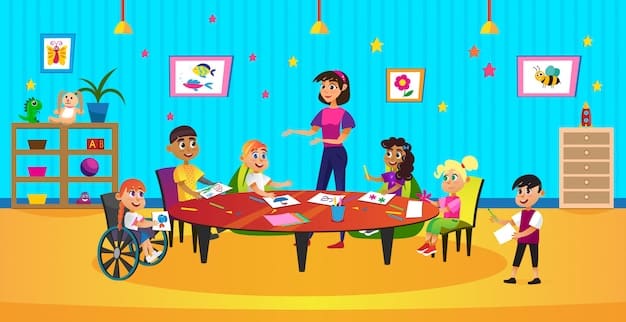Early Childhood Education: Investing in Your Child’s Future

Early childhood education is crucial as it establishes the foundation for a child’s future academic success, social skills, and overall well-being, making it a vital investment in their development.
Investing in your child’s future begins with understanding the importance of early childhood education: why investing in your child’s future matters. It’s more than just daycare; it’s a period of incredible growth and development.
Understanding Early Childhood Education
Early childhood education (ECE) encompasses the educational programs and activities designed for children from infancy through age eight. It’s a critical period of development where children learn foundational skills that set the stage for future learning and success.
ECE programs can take many forms, including preschools, kindergartens, child care centers, and home-based programs. These programs aim to foster cognitive, social, emotional, and physical development through structured play and age-appropriate learning activities.
Key Components of Early Childhood Education
Understanding the core elements of ECE helps parents and educators appreciate how these programs contribute to a child’s holistic development.
- Play-Based Learning: Children learn best through play, which allows them to explore, create, and solve problems in a fun and engaging way.
- Social-Emotional Development: ECE programs help children develop crucial social skills such as sharing, cooperation, empathy, and conflict resolution.
- Language and Literacy: Introducing children to language and literacy early on helps them develop a strong foundation for reading, writing, and communication.
- Cognitive Development: Activities designed to stimulate cognitive growth include problem-solving tasks, critical thinking exercises, and creative expression opportunities.
Early childhood education is not just about academic preparation; it’s about nurturing the whole child and setting them on a path to lifelong learning and success. By focusing on play-based learning, social-emotional development, language and literacy, and cognitive growth, ECE programs lay a solid foundation for future academic and personal achievements.
The Cognitive Benefits of Early Education
Early childhood education provides a wealth of cognitive benefits that extend far beyond the classroom. These benefits include improved problem-solving skills, enhanced memory, and increased creativity.
When children engage in stimulating learning environments from a young age, their brains develop more robust neural connections. This early cognitive stimulation can lead to long-term advantages in academic performance and intellectual curiosity.

Improved Problem-Solving Skills
ECE programs often emphasize problem-solving activities that encourage children to think critically and find solutions independently.
Enhanced Memory and Attention
Activities designed to improve memory and attention, such as storytelling and memory games, help children develop stronger cognitive abilities.
- Critical Thinking Skills: Early education fosters critical thinking by encouraging children to question, analyze, and evaluate information.
- Long-Term Academic Success: The cognitive skills developed in early childhood education contribute to improved academic performance throughout a child’s schooling.
- Adaptability and Resilience: Children who receive early education are often more adaptable and resilient in the face of academic challenges.
The cognitive benefits of early education provide children with a strong foundation for lifelong learning and success. By fostering critical thinking, enhancing memory, and promoting problem-solving skills, ECE programs help children develop the cognitive tools they need to thrive academically and intellectually.
Social and Emotional Development Through ECE
Social and emotional development is a crucial aspect of early childhood education. ECE programs provide children with opportunities to develop essential social skills, emotional intelligence, and self-confidence.
These skills are vital for building positive relationships, navigating social situations, and regulating emotions—laying the groundwork for healthy social and emotional well-being throughout life.
Building Social Skills
ECE programs create a supportive environment where children can interact with their peers and learn how to share, cooperate, and communicate effectively.
Developing Emotional Intelligence
Emotional intelligence, the ability to understand and manage one’s own emotions and recognize the emotions of others, is nurtured through ECE activities.

- Empathy and Compassion: Early education helps children develop empathy and compassion by encouraging them to consider the feelings and perspectives of others.
- Conflict Resolution: ECE programs teach children how to resolve conflicts peacefully and constructively, fostering positive relationships.
- Self-Confidence and Self-Esteem: Through praise and encouragement, ECE helps children build self-confidence and a positive sense of self.
Effective social and emotional development in ECE helps children thrive in various social settings, build strong relationships, and develop the emotional resilience needed to navigate life’s challenges.
The Long-Term Impact on Academic Achievement
The early years are crucial for setting the stage for long-term academic achievement. Children who participate in early childhood education programs often demonstrate higher academic performance throughout their schooling.
ECE provides a solid foundation in essential skills like literacy, numeracy, and critical thinking, which are crucial for future academic success.
Increased Graduation Rates
Studies have shown that children who attend ECE programs are more likely to graduate from high school and pursue higher education.
Better Performance on Standardized Tests
ECE can lead to better performance on standardized tests, providing children with a competitive edge in their academic careers.
- Improved Literacy Skills: Early education focuses on developing literacy skills, such as reading and writing, which are essential for academic success.
- Stronger Numeracy Skills: ECE programs help children develop a strong understanding of numbers and mathematical concepts.
- Positive Attitudes Towards Learning: Early education fosters a love of learning, making children more engaged and motivated in their studies.
Investing in early childhood education can have a profound and lasting impact on a child’s academic trajectory. By providing a solid foundation in essential skills, fostering a love of learning, and increasing graduation rates, ECE programs contribute to a child’s long-term educational success.
Economic Benefits for Families and Society
Investing in early childhood education not only benefits individual children but also yields significant economic benefits for families and society as a whole. ECE can reduce achievement gaps, increase workforce participation, and generate long-term cost savings.
These economic advantages underscore the importance of making ECE accessible and affordable for all families.
Reducing Achievement Gaps
ECE programs can help reduce achievement gaps between children from different socioeconomic backgrounds, providing all children with an equal opportunity to succeed.
Increasing Workforce Participation
By providing affordable child care options, ECE enables more parents, particularly mothers, to participate in the workforce.
- Enhanced Productivity: Early education leads to a more skilled and productive workforce, contributing to economic growth and prosperity.
- Reduced Crime Rates: Studies have shown that ECE can reduce crime rates by providing children with positive early experiences and opportunities.
- Long-Term Cost Savings: The long-term benefits of ECE, such as increased earnings and reduced healthcare costs, generate significant cost savings for society.
Investing in early childhood education is a strategic investment in the future economic well-being of families and communities. By reducing achievement gaps, increasing workforce participation, and generating long-term cost savings, ECE programs create a more equitable and prosperous society for all.
How to Choose the Right ECE Program
Choosing the right early childhood education program is a critical decision for parents. The ideal program should align with your child’s needs, values, and learning style.
Consider various factors such as program quality, curriculum, teacher qualifications, and environment to make an informed decision.
Evaluate Program Quality
Look for programs that are accredited by reputable organizations, such as the National Association for the Education of Young Children (NAEYC).
Assess Curriculum and Teaching Methods
Evaluate the program’s curriculum and teaching methods to ensure they are age-appropriate, engaging, and aligned with your child’s learning style.
- Teacher Qualifications and Experience: Choose programs with qualified and experienced teachers who are passionate about early childhood education.
- Safe and Stimulating Environment: Ensure the program provides a safe, clean, and stimulating environment that supports children’s learning and development.
- Parent Involvement Opportunities: Look for programs that encourage parent involvement and communication, fostering a strong partnership between home and school.
Finding the right ECE program involves careful consideration of various factors, including program quality, curriculum, teacher qualifications, and environment. By evaluating these aspects, parents can make an informed decision that supports their child’s optimal development and prepares them for future success.
| Key Aspect | Brief Description |
|---|---|
| 🧠 Cognitive Benefits | Enhances problem-solving, memory, and creativity for future learning. |
| 🤝 Social Development | Develops essential skills like sharing, cooperation, and empathy. |
| 📈 Academic Success | Improves literacy, numeracy, and critical thinking skills. |
| 💰 Economic Impact | Reduces achievement gaps and increases workforce participation. |
Frequently Asked Questions (FAQs)
▼
Early childhood education (ECE) refers to educational programs and activities for children from infancy through age eight, focused on holistic development.
▼
ECE is crucial because it lays the foundation for future academic success, social skills, and emotional well-being, setting children up for lifelong learning.
▼
The benefits include improved cognitive skills, social-emotional development, higher graduation rates, literacy and numeracy skills.
▼
Evaluate program quality, curriculum, teacher qualifications, and safety to make an informed decision that suits your child’s needs.
▼
ECE leads to reduced achievement gaps, increased workforce participation, and long-term cost savings, benefiting families and society in the long run.
Conclusion
Investing in the importance of early childhood education: why investing in your child’s future matters is one of the most impactful decisions a parent can make. The cognitive, social, emotional, economic, and academic advantages of ECE provide children with a solid foundation for success in all aspects of life, paving the way for a brighter and more promising future.





